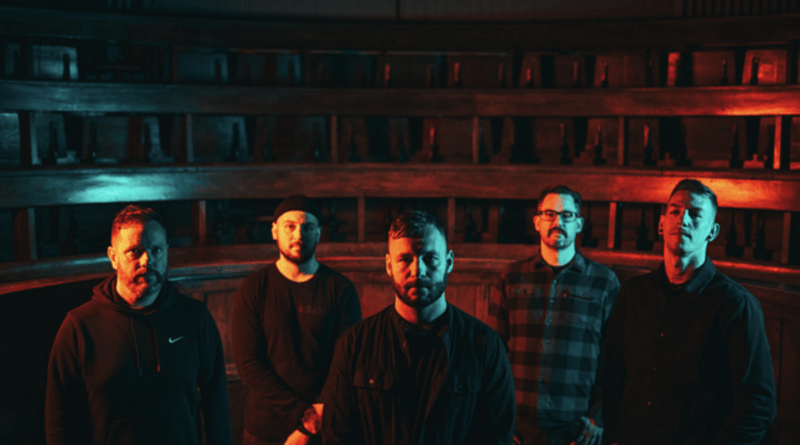Dvne: A Journey Of Generations
Scotland’s progressive post-metallers DVNE blew the scene’s collective minds with their second album, and first for Metal Blade, Etemen Ænka. Its towering melodies, serpentine leads and cataclysmic riffs were the perfect conduit for their heady sci-fi concept narrative, only heavily inspired (unsurprisingly, given their Twitter handle of SongsOfArrakis) by Frank Herbert’s Dune. Its follow-up, Voidkind, is every bit as exhilarating, with the band making a conscious effort to rein in some of its predecessor’s excesses and further explore the realms of science fiction. We sat down with guitarist Allan Paterson to talk about the task of creating a sequel to an already monumental album.
“We were a bit dumbfounded at points,” he admits of their reaction to the adulation Etemen Ænka received. That said, the pressure to create its follow-up – a process that lasted a good couple of years – didn’t come from outside the band. “It was more from ourselves,” Allan explains, “we wanted to make something a bit different. We wanted some bits more concise, and we knew what we wanted it to be going in.” With a relatively long gestation, the band knew they wanted to make the most of their time in studio recording; so they brought it to them.
Hiring an old tower on the outskirts of Edinburgh, the group set up camp for three weeks and brought their longtime friend and producer Graeme Young with them, effectively setting up a mobile studio there and able to immerse themselves in the whole experience. “Before we went in for those three weeks, we did a week of pre-production with Graeme. He’d give us suggestions, helping us with a different set of ears, which was really useful.” That wasn’t the only help they got either, with Creative Scotland once more helping fund the endeavour, something DVNE are immensely grateful for.
As for the album itself and some of those creative leaps, lead single Plērōma is a bold statement, arguably their most “prog” song to date with its lush melodies and relative accessibility. Opener Summa Blasphemia is also far more immediate than Enûma Eliš from Etemen Ænka, a very deliberate choice that pulls the listener into their world of sludgy riffs and scorching vocals immediately. It’s an album that they started writing around two years ago, as they sought to create what became Voidkind and flesh out its conceptual narrative.
Unlike their last two albums, Allan confirms that Voidkind is set in its own universe, separate from the others. This time, they’re following a religious cult across generations as they seek to attain their ultimate goal; so far, so Bene Gesserit, but another big influence outside of Arrakis this time was Dan Simmons’ Hyperion novel. Particularly, the way he used disparate narrative threads to tell concurrent stories that eventually coalesce in the end. “We came up with the full concept beforehand,” Allan explains. “Dan (Barter, guitar) and Victor (Vicart, keys/guitar/vocals) flesh it all out. This one’s quite non-linear, and more in the first person so we take on more characters for some of the songs.”
Voidkind hops between each character, as Hyperion did, throughout its runtime, the cult pushing ever on to their goal of eventual godhood, though closer Cobalt Sun Necropolis is where it all comes to a head. “That’s where everything goes wrong,” grins Paterson. Those moments include the loping Sarmatæ that sees the protagonists riding, travelling on giant beasts. “It’s got that groove to it,” he explains, “the lyrics came last, so we wrote from the overall vibe and knowing what part of the story the song told.”
A lot of the changes, particularly the desire for immediacy, have been driven by DVNE’s experience playing live – although he does point out they never play a song they haven’t recorded yet. “It was the main part,” he agrees of more immediate moments being driven by a desire to have songs translate better live. “We like playing long songs,” he clarifies – as if there were fears that DVNE might all of a sudden forego their brilliant, progressive streak. “Etemen started with about 40 seconds of nothing,” Paterson recalls, “so we wanted to cut down some of those sections or trim a bit of fat that didn’t need to be there.”
The end result speaks for itself; Voidkind might still be a sprawling, near-hour sci-fi opus, but it’s never anything but electrifying. Opener Summa Blasphemia, for instance, is all thunderous guitars and cavernous roars up front with no introduction; we’re very much in the belly of the beast from the get go. “We’re telling the same sort of story in a shorter song,” he explains, “but we don’t cut things out. The songs are as long as they need to be.” In fact, they’re already thinking of what they’ve learned now for LP4.
“We’ll probably go in more prepared,” he laughs. “I’m hoping we’ll have everyone involved more in writing, get their influences in.” He singles out late album track Abode Of The Perfect Soul as a hint at the direction that might see them going in; a sludgy, dense battering ram that still knows how to find beauty in desolation. That the band are already looking ahead speaks volumes, refusing to rest on their laurels and shows that even while Voidkind is a stellar record from an incredible band, DVNE are ready to not only take on the world’s stages, but take the next step already.
Voidkind is out now via Metal Blade Records.
Like DVNE on Facebook.

